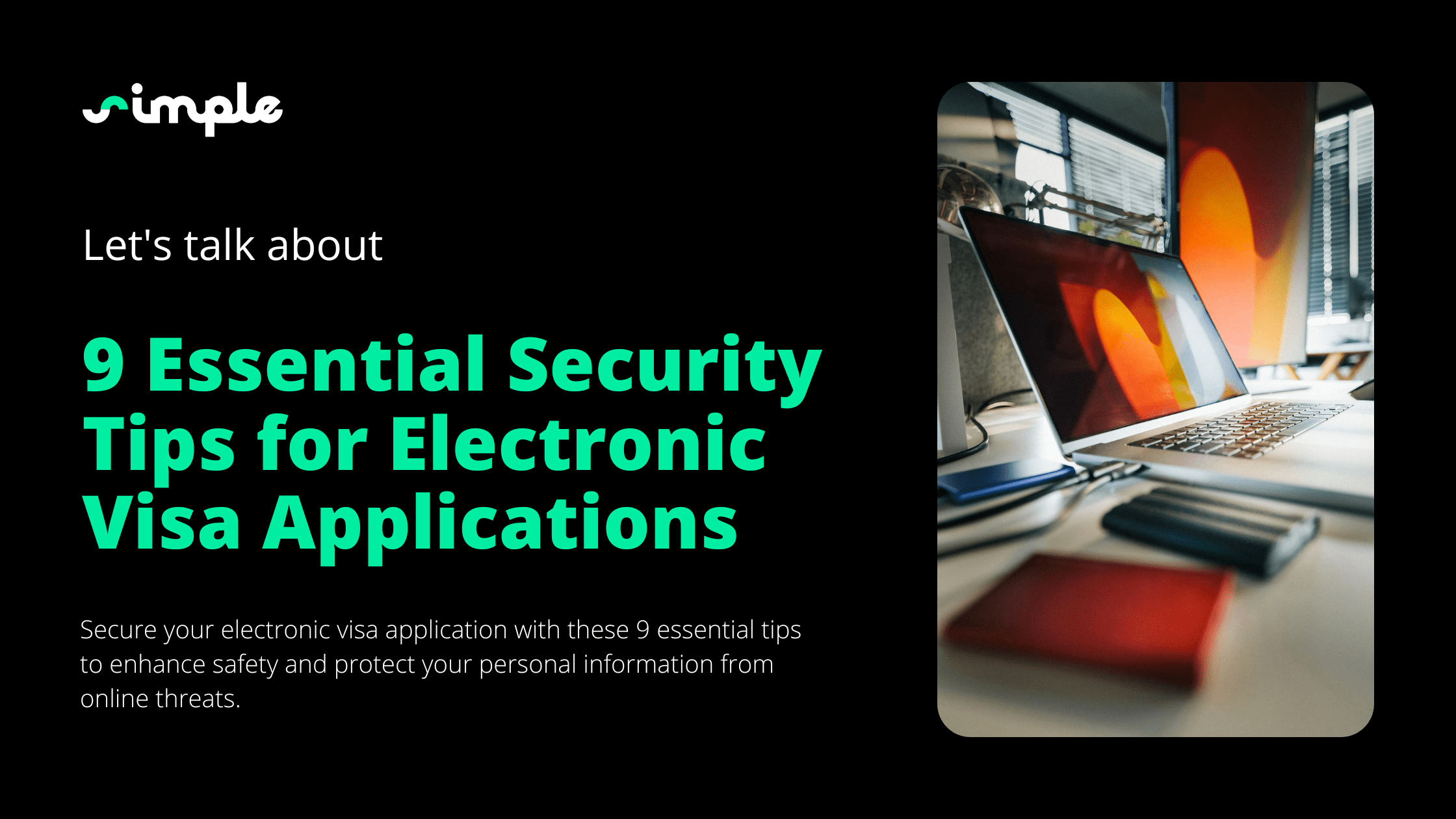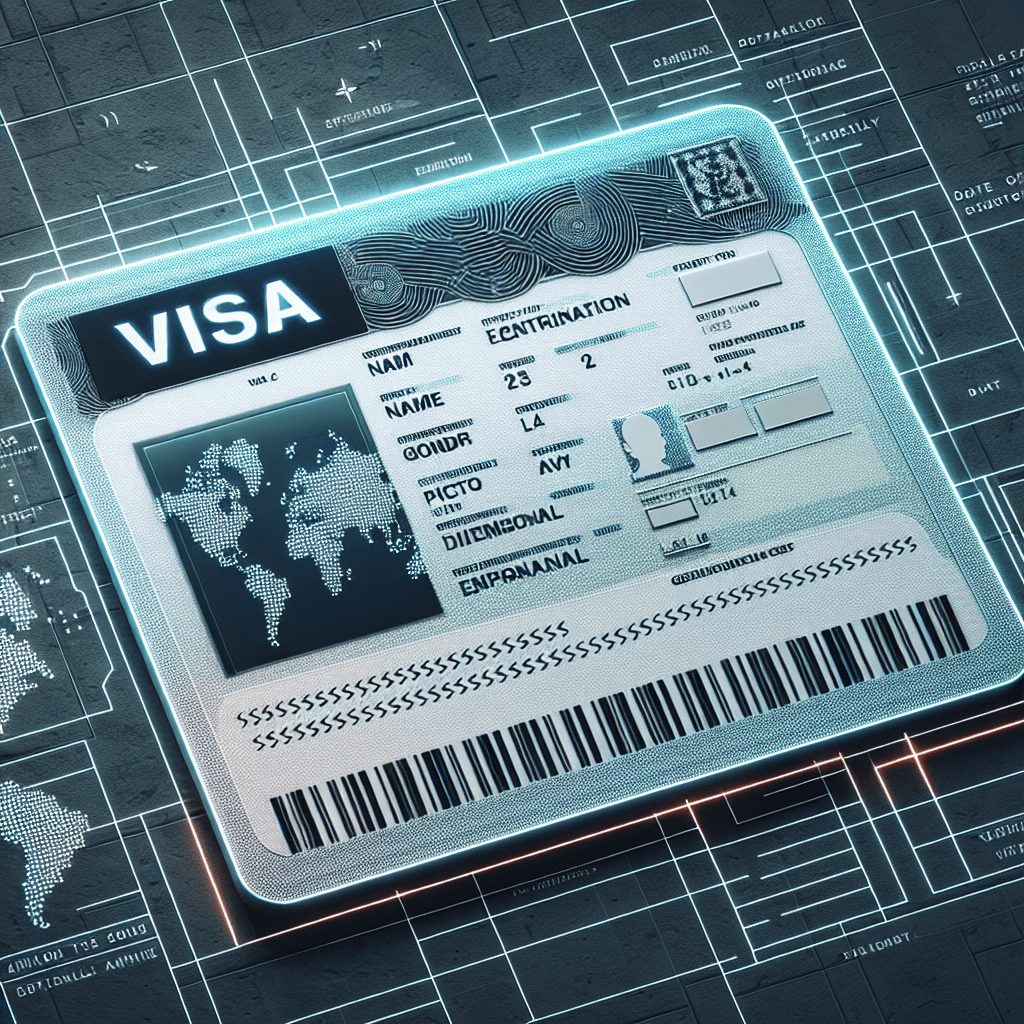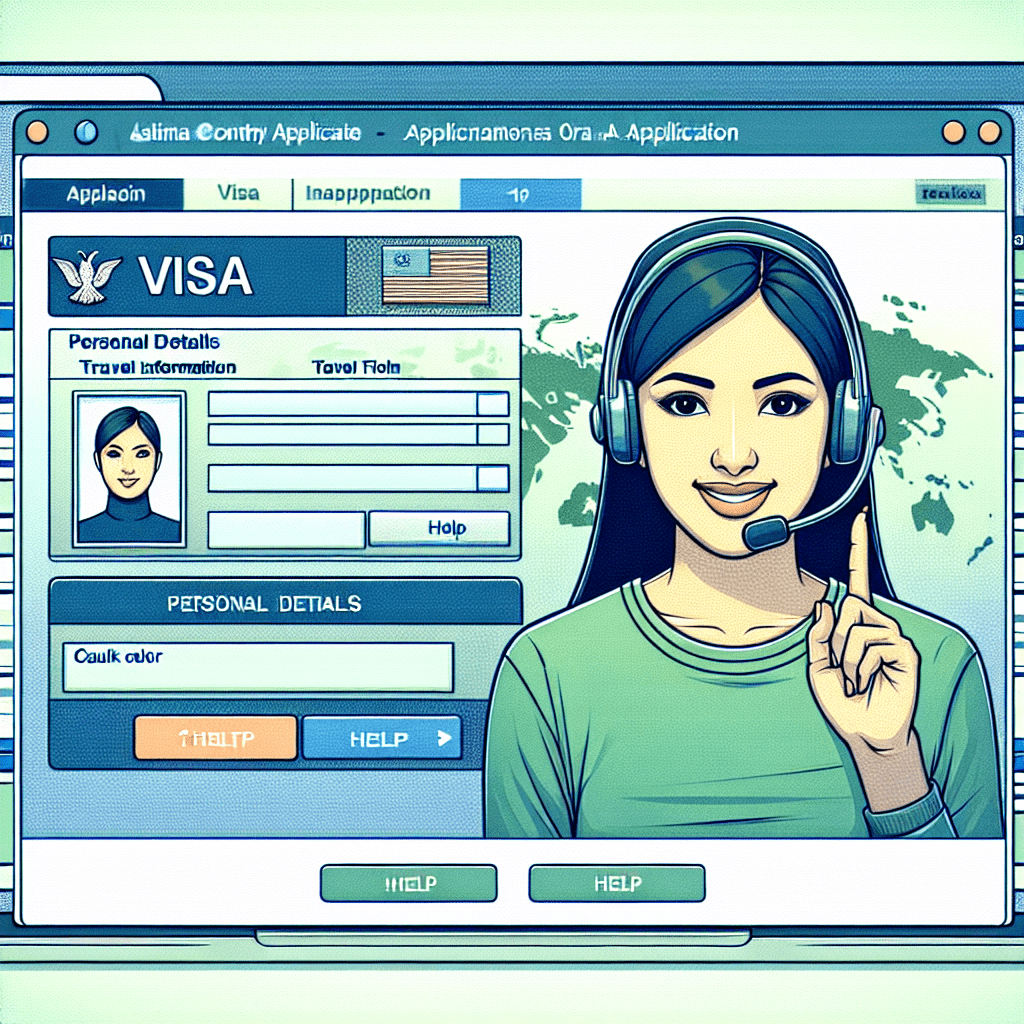9 Essential Security Tips for Electronic Visa Applications

In today’s fast-paced world, the convenience of electronic visas has revolutionized global travel. As more countries adopt electronic visa systems, travelers can now apply for their travel permits online, saving time and effort. However, with this increased reliance on digital platforms comes the critical need to secure personal information during the application process. Cyber threats and data breaches are on the rise, making it imperative for applicants to be vigilant and informed. Understanding the importance of safeguarding your digital travel authorization is the first step in ensuring a smooth and secure journey. This article delves into nine essential security tips that every traveler should consider when applying for an electronic visa. By following these guidelines, you can protect your sensitive information and enjoy peace of mind as you prepare for your next adventure.

Understanding Electronic Visa Systems
Explanation of How Electronic Visa Systems Work
Electronic visa systems have transformed the way travelers obtain permission to enter foreign countries. These systems allow applicants to submit their visa requests through an online visa application process, eliminating the need for physical paperwork and in-person visits to embassies or consulates. The process typically begins with the applicant filling out a web-based visa application form, providing necessary personal information, travel details, and sometimes, supporting documents such as a passport scan or a photograph.
Once the application is submitted, it enters the e-visa processing phase, where it is reviewed by the relevant government authorities. In many cases, governments collaborate with third-party platforms to manage the influx of applications and ensure a seamless digital experience for users. These platforms facilitate the digital travel authorization process by providing a secure and efficient interface for both applicants and officials. The role of these third-party platforms is crucial, as they help streamline the electronic travel permit issuance, making it faster and more accessible for travelers worldwide.
After the application is reviewed and approved, the applicant receives a digital visa approval notification, often via email. This electronic entry permit can then be printed or stored on a mobile device to be presented upon arrival at the destination country. The entire process, from submission to approval, is designed to be user-friendly and time-efficient, reflecting the growing trend towards digital solutions in global travel.
Common Vulnerabilities in Electronic Visa Applications
Despite the convenience offered by electronic visa systems, they are not without vulnerabilities. One of the primary concerns is the risk associated with data transmission. As personal information is sent over the internet, it becomes susceptible to interception by malicious actors. Hackers may exploit unsecured networks or outdated encryption methods to access sensitive data, leading to potential identity theft or fraud.
Another significant vulnerability lies in authentication loopholes. Many electronic visa services rely on basic authentication methods, such as passwords or security questions, which can be easily compromised. Without robust multi-factor authentication, unauthorized individuals may gain access to an applicant’s account, altering or stealing their information. This risk is exacerbated by the use of weak or reused passwords, which are common among users.
To mitigate these risks, it is essential for both applicants and service providers to prioritize security measures. Applicants should ensure they are using secure, encrypted connections when submitting their applications and be cautious of phishing attempts that may mimic legitimate visa platforms. Service providers, on the other hand, must implement advanced security protocols and regularly update their systems to protect against emerging threats.
Importance of Staying Informed About Technology Updates
In the rapidly evolving landscape of digital technology, staying informed about the latest updates and security protocols is crucial for both travelers and service providers. Governments and third-party platforms must continuously adapt to new security standards to safeguard the integrity of the electronic visa system. This includes implementing cutting-edge encryption technologies, regularly auditing their systems for vulnerabilities, and providing users with clear guidelines on how to protect their information.
For applicants, being aware of the latest technology updates can significantly enhance their security posture. By understanding the benefits of adapting to the latest standards, such as improved encryption methods or enhanced authentication processes, travelers can make informed decisions about their online travel visa applications. This proactive approach not only helps protect personal data but also ensures a smoother and more reliable application experience.
Ultimately, the success of electronic visa systems hinges on the collective efforts of governments, service providers, and travelers to prioritize security and stay informed about technological advancements. By embracing these updates and maintaining a vigilant approach to data protection, the global travel community can continue to enjoy the benefits of digital entry visas while minimizing potential risks.

Enhancing Personal Security Practices
Using Secure Networks for Application Submissions
When applying for an electronic visa, ensuring the security of your internet connection is paramount. One of the most significant risks associated with online visa applications is the use of public Wi-Fi networks. These networks, often found in cafes, airports, and hotels, are typically unsecured, making them prime targets for cybercriminals. Hackers can easily intercept data transmitted over public Wi-Fi, potentially gaining access to sensitive information such as personal details and payment credentials.
To mitigate these risks, it is advisable to use secure, encrypted connections when submitting your application. A Virtual Private Network (VPN) is an excellent tool for enhancing online security. By encrypting your internet traffic, a VPN ensures that your data remains private and protected from prying eyes. Additionally, connecting to a trusted, password-protected Wi-Fi network at home or work can provide an added layer of security during the e-visa processing phase.
Being mindful of the network you use for your online travel visa application is a simple yet effective way to safeguard your personal information. By prioritizing secure connections, you can significantly reduce the risk of data breaches and ensure a smoother application process.
Strengthening Passwords and Login Credentials
Another critical aspect of enhancing personal security when applying for an electronic visa is the strength of your passwords and login credentials. Weak or easily guessed passwords are a common vulnerability that cybercriminals exploit to gain unauthorized access to accounts. To protect your online visa application, it is essential to use complex and unique passwords for each account.
A strong password typically includes a combination of uppercase and lowercase letters, numbers, and special characters. Avoid using easily guessed information such as birthdays, names, or common words. Instead, opt for a random string of characters or a passphrase that is both memorable and difficult to crack. Additionally, it is crucial to use different passwords for each account to prevent a single breach from compromising multiple accounts.
To manage multiple complex passwords, consider using a password management tool. These tools securely store and generate strong passwords, allowing you to access your accounts without the need to remember each password individually. By adopting these practices, you can enhance the security of your digital travel authorization process and protect your personal information from unauthorized access.
Verifying the Authenticity of Online Visa Platforms
With the proliferation of internet-based visa services, it is essential to verify the authenticity of the platforms you use for your electronic visa application. Cybercriminals often create fake websites that mimic legitimate visa platforms to trick users into providing personal information. Recognizing and avoiding these phishing scams is crucial for protecting your data.
When accessing an online visa application platform, ensure that the website is secure by checking for a padlock icon in the address bar and a URL that begins with “https://”. These indicators signify that the website uses encryption to protect your data. Additionally, verify that the platform is an official government portal or a reputable third-party service by checking for contact information, customer reviews, and official endorsements.
Be wary of unsolicited emails or messages that prompt you to click on links or provide personal information. These are common tactics used in phishing scams. Always navigate directly to the official website by typing the URL into your browser rather than clicking on links from unknown sources. By taking these precautions, you can ensure that your online immigration visa application is submitted through a secure and legitimate platform, safeguarding your personal information from potential threats.

Safeguarding Personal Data
Awareness of Data Sharing Permissions and Purposes
When engaging with electronic visa services, it is crucial to be aware of how your personal data is being used and shared. Understanding data sharing permissions and the purposes for which your information is collected can help you make informed decisions about your online visa application. One of the first steps in safeguarding your data is to thoroughly review the privacy policies and terms of service of the e-visa platform you are using.
Privacy policies provide insight into how your data will be handled, including who will have access to it and for what purposes it will be used. By familiarizing yourself with these details, you can ensure that your personal information is only shared with authorized parties and for legitimate reasons. Additionally, it is important to give explicit consent before sharing any personal information. This means actively agreeing to the terms and conditions set forth by the service provider, rather than passively accepting them.
Being proactive about understanding data sharing permissions not only protects your personal information but also empowers you to take control of your digital travel authorization process. By staying informed and vigilant, you can minimize the risk of unauthorized data access and ensure a secure application experience.
Monitoring Visa Application Status and Communications
Once you have submitted your online travel visa application, it is essential to monitor its status and any communications you receive from the authorities. Recognizing legitimate communications from government agencies or authorized e-visa platforms is crucial in protecting yourself from potential scams or fraudulent activities.
Legitimate communications will typically come from official email addresses or phone numbers and will include specific details about your application. Be cautious of any unsolicited messages that request additional personal information or payment, as these may be attempts to deceive you. If you receive a suspicious communication, verify its authenticity by contacting the official agency or platform directly through their verified contact information.
In addition to recognizing legitimate communications, it is important to detect and report any suspicious activities related to your online immigration visa application. This includes unauthorized access attempts, unexpected changes to your application status, or any discrepancies in the information provided. Reporting these activities to the relevant authorities can help prevent potential security breaches and protect your personal data.
Utilizing Additional Security Measures
To further safeguard your personal data during the e-visa processing phase, consider implementing additional security measures. One effective method is the use of two-factor authentication (2FA), which adds an extra layer of protection to your accounts. With 2FA, you are required to provide a second form of verification, such as a code sent to your mobile device, in addition to your password. This makes it significantly more difficult for unauthorized individuals to access your account, even if they have your login credentials.
Another valuable security measure is the use of trusted security software. Antivirus programs and firewalls can help protect your devices from malware and other cyber threats, ensuring that your personal information remains secure. Regularly updating your security software and operating system is also important, as it ensures that you have the latest protections against emerging threats.
By incorporating these additional security measures into your online visa application process, you can enhance the protection of your personal data and reduce the risk of unauthorized access. These proactive steps, combined with a vigilant approach to data sharing and communication monitoring, can help ensure a secure and successful digital entry visa application experience.

Conclusion
Securing electronic visa applications is paramount for ensuring personal safety and data protection in today’s digital age. As the world increasingly relies on online visa application systems, the potential risks associated with cyber threats and data breaches cannot be overlooked. By understanding the intricacies of electronic visa systems and recognizing common vulnerabilities, travelers can take proactive steps to safeguard their personal information. The importance of securing your digital travel authorization extends beyond the application process; it is a critical component of protecting your identity and ensuring a smooth travel experience. As cybercriminals continue to evolve their tactics, staying informed and vigilant is essential for maintaining the integrity of your electronic travel permit.
Applying the security tips discussed throughout this article can significantly enhance the safety and security of your visa application experience. By using secure networks, strengthening passwords, verifying the authenticity of online platforms, and safeguarding personal data, you can minimize the risk of unauthorized access and data breaches. These measures, combined with a commitment to staying informed about the latest security protocols, empower you to navigate the e-visa processing landscape with confidence. As you prepare for your next journey, remember that taking these precautions not only protects your personal information but also contributes to a more secure and reliable global travel environment. Embrace these practices to ensure a safer and more secure online travel visa application process, allowing you to focus on the excitement and opportunities that await you in your destination.